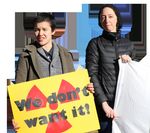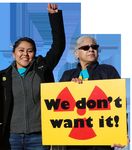WHAT THE OMNIBUS SPENDING BILL MEANS FOR FRONTLINE COMMUNITIES
←
→
Page content transcription
If your browser does not render page correctly, please read the page content below
WHAT THE OMNIBUS SPENDING BILL MEANS FOR FRONTLINE COMMUNITIES What is the Omnibus Appropriations Bill? The Consolidated Appropriations Act 2021 business interests (and have nothing to do (Pub.L.116-260/HR 133), or spending bill as with Covid relief) were added to the bill. it is sometimes referred to, is a $2.3 trillion Some of them are ways to prop up and spending bill that combined $900 billion in continue subsidizing the fossil fuel industry, stimulus relief for the COVID-19 pandemic which is in trouble because more sustainable, with a $1.4 trillion omnibus spending bill for renewable, and cleaner energies--such as the 2021 federal fiscal year. Bills like this wind and solar—are coming to the forefront. are referred to as “omnibus” because they The Appropriations Act includes the bipartisan package together many different proposals and Energy Act of 2020, a comprehensive national measures so they can all be voted on at once. energy policy that increases tax credits and On his way out, Trump signed the Consolidated funding for research in renewable energy. Appropriations Act into law on December 27, The bill provides $35 billion over five years to 2020. It will be in effect until September 30, support wind, solar, geothermal and hydro- 2021. The bill is one of the largest spending power. This support also measures ever enacted, surpassing the $2.2 includes nuclear power, trillion CARES Act enacted in March 2020. At and carbon capture 5,593 pages, the legislation is the longest bill and storage. Congress ever passed. As typically occurs in Congress, many initiatives that favor corporate and big
How Will It Impact BIPOC, Frontline, Environmental
Justice Communities?
The bill provides a lot of funding for research and development (R & D) in areas of concern for those
seeking a Just Transition away from the long-time dependence on fossil fuels. These include technol-
ogies for capturing and storing carbon, which are currently
being promoted as solutions to the climate crisis. Carbon capture
and sequestration (CCS); carbon capture, use, and storage (CCUS);
and experimental plans for capturing carbon directly from the air
are all included. Support for developing biofuels and an increase in
tax credits for oil companies that buy carbon for use and/or storage
are provided. We also see an enthusiasm for nuclear energy that is
unusual for a Democrat-controlled Congress.
The funding for all of these measures was approved with the bill.
Taking practical actions to oppose these ideas is going to need in-
genuity and solidarity. We should keep in mind that the technology
for some proposals does not yet exist. The bill is designed to make it
happen. For a closer look at the problems with carbon capture
see CJA’s fact sheet on Carbon Capture and Storage:
A Clear and Present Danger.
The following is a quick view of some of the bill’s energy provisions that present problems
for frontline communities. They do nothing to cut polluting carbon emissions, and they
support the continued use of fossil fuels--in other words, business as usual.
• Fast Forward Carbon Capture, • Increased Tax Breaks for the
Use, and Storage Fossil Fuel Industry
Includes billions of dollars to accelerate the 45Q is a long-running program that re-
development, deployment, and commercial- wards oil companies for buying CO2 that is
ization of carbon capture technologies. The removed from industrial smokestacks. Most
Department of Energy (DOE) must establish of it gets used for Enhanced Oil Recovery
a competitive process to enter into agree- (EOR), in which companies pump liquid
ments with industry stakeholders to build CO2 into old oil wells to keep them produc-
and operate six demonstration projects that ing, so oil companies save on taxes while
will capture CO2 from plants that run on continuing to profit from oil extraction. It’s
coal or natural gas. The captured CO2 will a win-win for the industry. Companies
be used in products like plastic or cement. can also get a break for storing purchased
It will re-enter the atmosphere at the end of carbon underground--a dangerous practice,
the product’s life. The bill also provides for given there is no guarantee that the carbon
$2 billion in loans and loan guarantees under will stay there.
the Rural Electrification Act for construction
or retrofitting of fossil fuel power plants with
CCS/CCUS.
The Omnibus Spending Bill - 2• Direct Air Capture (DAC) • Hydrogen
Authorizes fiscal investment in R & D for re- Authorizes R & D and a large-scale pilot pro-
moving carbon from the atmosphere at large gram for carbon capture and storage using
scale. This technology does not yet exist. It is a hydrogen steam methane process. This is
concerning that the approach may be linked another method of achieving controversial,
to agricultural practices. unproven carbon storage.
• Nuclear Energy • Uranium Mining
$1.5 billion for Nuclear energy research and Creates a domestic uranium reserve to
development (an increase of $14 million support uranium mining in the U.S. (Most
over 2020) to develop the next generation uranium is imported.) This can be seen as a
of nuclear reactors, while disregarding the bailout for the floundering domestic uranium
numerous streams of radioactive waste, industry. The mining, processing, and enrich-
including irradiated (“spent”) ment of uranium for reactor fuel produces
nuclear fuel, which is lethally immense amounts of radioactive waste,
radioactive for hundreds and has an extensive
of years and environmen- track record of
tally hazardous for up to contaminating
a million years. Indig- land, air, and
enous nations and drinking water–
communities of color disproportionately
are most often tar- affecting
geted for radioactive Indigenous
waste dumps. peoples.
Anti-nuclear protest in Albuquerque, New Mexico, Photos by Hendrik Voss
What Can We Do?
We don’t know what implementation of this bill will look like, but we do know
it is already affecting our members.
In Newark, New Jersey, CJA member Ironbound nity safety, given the risk of many of these un-
Community Corporation (ICC) and partners are proven technologies. Watch what your Congres-
getting out the word about a new sludge treat- sional representatives are doing, educate in your
ment plant that is trying to set up shop in their community, and keep questioning false promises
community. In it’s permit application, the compa- that hinge on continued fossil fuel extraction.
ny claims it will repurpose solid waste, including
sewage waste (sludge), so that the CO2 can be
converted to biochar and used in cement produc-
tion. This is a variant on carbon capture--one of
the technologies promoted by the Trump admin-
istration that was carried over to the Omnibus
Appropriations Act of 2021.
So stay tuned for next steps. In the meantime,
keep an eye out for new facilities proposed for
your state and insist on guarantees for commu- Ironbound Community Corporation contingent at the People’s Climate March.
Photo by Rae Breaux
The Omnibus Spending Bill - 3You can also read






















































